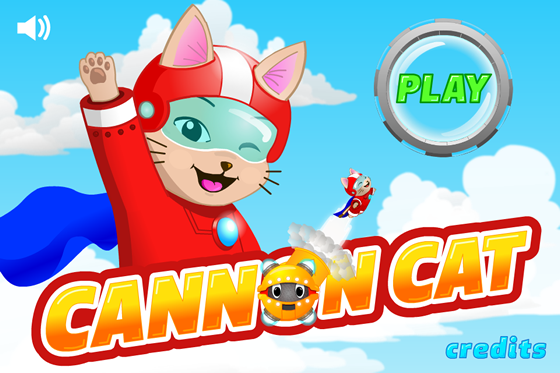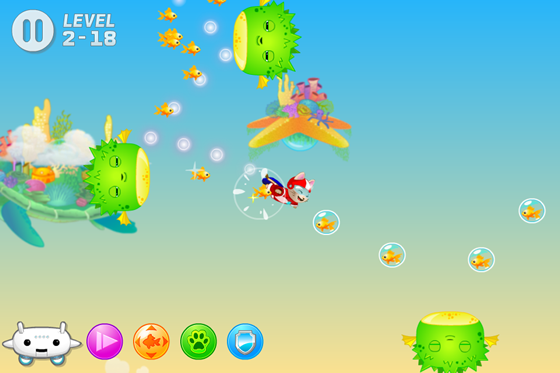 As part of our Founders Spotlight Series, we like to shine a light on our members’ startups and explain what they did right and wrong. This week, we’re proud to feature Loqheart and their amazing game Cannon Cat.
As part of our Founders Spotlight Series, we like to shine a light on our members’ startups and explain what they did right and wrong. This week, we’re proud to feature Loqheart and their amazing game Cannon Cat.
Here’s their story written by David and Don, the founders:
With zero marketing budget, one passionate programmer, an artistic rocket scientist, and a wacky flying cat character, you too can get to the top of Apple’s mobile gaming charts!
Okay so maybe it’s not that common or easy of a formula. In fact, like most success stories, it took a lot of hard work and risk-taking. 9 months ago, Don and I took the leap of faith to pursue our own mobile game. After reflecting on our experience, we’ve come to the conclusion that the small decisions we made as a business defined who we were and how we stood out from the crowd. Here are the lessons we learned:
Lesson 1: Give and ye shall receive…a lot!
Let’s face it. We all want to be rich and make millions off our business ideas. And the spectres of time and money are always breathing down our necks to go faster and focus. So should we really spend our precious time helping other people? A resounding YES should be your answer.
 Each time we were faced with the question of either working on our own game vs. helping others. We always made time to help others. And this went way beyond just commenting on a forum. We were spending time debugging other people’s code, designing entire interfaces for other people, attending every meetup we could with other game designers. But everyone has given back in kind, offering up their skills and expertise to make Cannon Cat even better. Way better. And this extended to marketing as well. We helped and became friends with everyone who eventually promoted Cannon Cat.
Each time we were faced with the question of either working on our own game vs. helping others. We always made time to help others. And this went way beyond just commenting on a forum. We were spending time debugging other people’s code, designing entire interfaces for other people, attending every meetup we could with other game designers. But everyone has given back in kind, offering up their skills and expertise to make Cannon Cat even better. Way better. And this extended to marketing as well. We helped and became friends with everyone who eventually promoted Cannon Cat.
At the beginning of this, I would have said it was a huge waste of time. But now we know the value of giving. After all, we’re little startups right? We have to stick together if we’re going to take on those big guys, right?
Lesson 2: Alright is not good enough. Do it again.
Like most lean-startups or product designers, we know the value of iteration. But even so, sometimes it takes a kick to the head to remind us. Seeing other people succeed with an iterative process made us drop our complicated word game (our first idea) and instead focus on prototyping game ideas. Don suggested something crazy.
“Let’s do 8 games in 8 weeks.”
On day 1 we would pitch a game idea or mechanic, and on day 7 we’d have a post-mortem. We were burnt out after 4 weeks, but it did give us a bunch of prototypes and taught us a lot. We learned how to make quick decisions and work in parallel, so we could get something good enough to play. The prototype that tested the best with people was of course, Cannon Cat.
But once we started developing Cannon Cat, we quickly decided the “good enough” mentality of those sprints would not carry over into the market. We wanted to create something really polished. And that would take a lot of perfectionism and iteration.
 It’s a running joke between Don and I about how dissatisfied he was with the clouds I designed. Almost every day, he would end each conversation with something like,
It’s a running joke between Don and I about how dissatisfied he was with the clouds I designed. Almost every day, he would end each conversation with something like,
“You know David, I was looking at the clouds in the sky this morning. And our clouds just aren’t good enough. They have no texture to them.”
I was fine with our clouds. I thought they were alright.
But alright is not good enough. Don’s initial reaction was the truth. It was instinctual. He looked at it like any of our players might, and thought…”eh.” That’s not good enough.
In fact, we presented our icon to an ex-Apple editor that spoke at Founders Space. He glanced at it and said, “Yeah, it’s alright.” Don and I knew what that meant. That meant it would get lost in the crowd of other icons. It wasn’t good enough. We had to do it again, and again, and again, until the reaction we got from everyone was a unanimous “Awesome!”
Lesson 3: Break their expectations, and they’ll remember you.
“So when the cat eats all the fish, they get a bonus right?”
“Wait, why does the cat have to eat the fish?”
“Cats eat fish don’t they?”
“Maybe, but wouldn’t it be better if the cat saved the fish instead?”
Cats eat fish. Birds fly in the sky. And pigs are pink. Everyone has expectations about how the world works and games often reflect that reality. But that’s also really boring. People remember things that break those expectations. In games, pigs should be green. In games, cats should save the fish, not eat them. And villains should be emus, not ostriches because it’s different and new. Don’t be boring. Take every opportunity you can to break people’s expectations.
After all is said and done, we’re just at the beginning of our journey. Cannon Cat still has a long way to go, and we’re excited to have the opportunity to build up our business. We welcome any of you to share your expertise with us, and we’ll return the favor 🙂
www.cannoncat.com | Cannon Cat on iTunes | www.loqheart.com






Leave a Reply